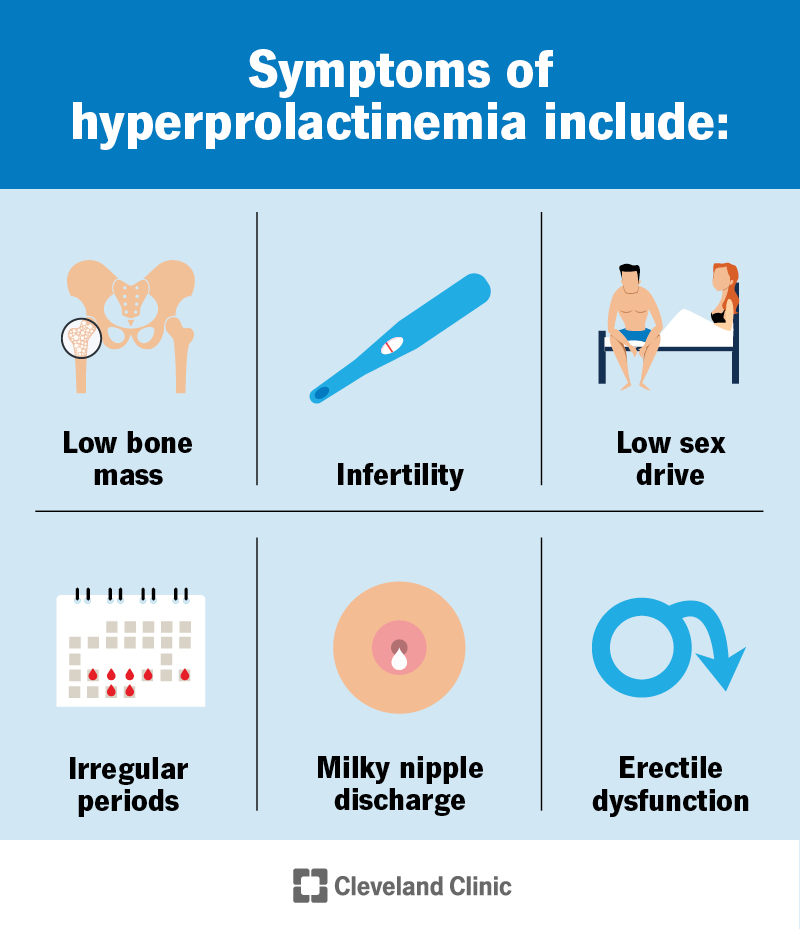Hyperprolactinemia means you have high levels of prolactin in your blood. The most common cause is a prolactinoma, a benign (noncancerous) tumor in your pituitary gland. Certain health conditions and medications can also cause hyperprolactinemia.
Advertisement
Cleveland Clinic is a non-profit academic medical center. Advertising on our site helps support our mission. We do not endorse non-Cleveland Clinic products or services. Policy
Hyperprolactinemia happens when you have high levels of prolactin in your blood. Prolactin is a hormone that’s responsible for breast tissue development and lactation.
Advertisement
Cleveland Clinic is a non-profit academic medical center. Advertising on our site helps support our mission. We do not endorse non-Cleveland Clinic products or services. Policy
Hyperprolactinemia isn’t life-threatening. But it can cause infertility and other issues that can impact your quality of life. The good news is that it’s treatable.
Hyperprolactinemia affects less than 1% of the general population. Women are more likely to have the condition than men.

Image content: This image is available to view online.
View image online (https://my.clevelandclinic.org/-/scassets/images/org/health/articles/22284-hyperprolactinemia)
Some people who have hyperprolactinemia have very mild or no symptoms (are asymptomatic).
For anyone, hyperprolactinemia can cause the following symptoms:
For women, symptoms of hyperprolactinemia include:
For men, common symptoms of hyperprolactinemia include:
Several factors and conditions can cause hyperprolactinemia, including:
Sometimes, healthcare providers can’t find the cause. They call this idiopathic hyperprolactinemia. It usually goes away without treatment after several months.
Advertisement
A prolactinoma is the most common cause of hyperprolactinemia. A prolactinoma is a benign (noncancerous) tumor (adenoma). It forms in your pituitary gland. It causes excess production of prolactin.
Large tumors (other than prolactinomas) in or near your pituitary gland may cause hyperprolactinemia. This is usually because the tumor prevents dopamine from reaching your pituitary gland. Dopamine stops prolactin production.
Radiation therapy for tumors on or near your pituitary gland may also cause hyperprolactinemia.
The brain chemical dopamine helps suppress (stop) prolactin production. Any medication that affects dopamine production can make your prolactin levels rise.
Medications that can cause hyperprolactinemia include:
Your prolactin levels will usually return to normal three to four days after you stop taking the medication. Never stop taking a prescribed medication unless your healthcare provider tells you to.
Health conditions other than a prolactinoma that may cause hyperprolactinemia include:
The only known risk factor for hyperprolactinemia is having multiple endocrine neoplasia (MEN) type 1 (MEN1). MEN1 is an inherited condition that can cause prolactinoma.
If you have a first-degree relative (biological sibling or parent) who has MEN1, you may want to get genetic testing. It might help screen for and catch a prolactinoma in its early phase.
Your healthcare provider will start with a prolactin (PRL) blood test.
If your results show that you have hyperprolactinemia, the next step will be to determine the cause. Your provider may recommend additional testing, like other blood tests and imaging tests.
The treatment for hyperprolactinemia depends on its cause. If you have high prolactin levels but have few or no symptoms, you may not need treatment.
Advertisement
Treatment options for prolactinomas (the most common cause of hyperprolactinemia) include:
If a medication is causing hyperprolactinemia, your healthcare provider may prescribe a different one that doesn’t affect your prolactin levels as much.
The prognosis (outlook) for hyperprolactinemia is generally good. Treatment for its most common cause is usually effective.
Although hyperprolactinemia isn’t life-threatening, it can cause certain issues like infertility and irregular periods. Because of this, it’s important to receive treatment if you have hyperprolactinemia.
If you have hyperprolactinemia, it may be helpful to ask your healthcare provider:
Advertisement
Hyperprolactinemia can affect your quality of life and cause infertility. The good news is that it’s highly treatable. If you’re experiencing symptoms of hyperprolactinemia, talk to your healthcare provider. They can run a simple blood test to see if your prolactin levels are elevated.
Advertisement
Learn more about the Health Library and our editorial process.
Cleveland Clinic's health articles are based on evidence-backed information and review by medical professionals to ensure accuracy, reliability, and up-to-date clinical standards.
Cleveland Clinic's health articles are based on evidence-backed information and review by medical professionals to ensure accuracy, reliability, and up-to-date clinical standards.